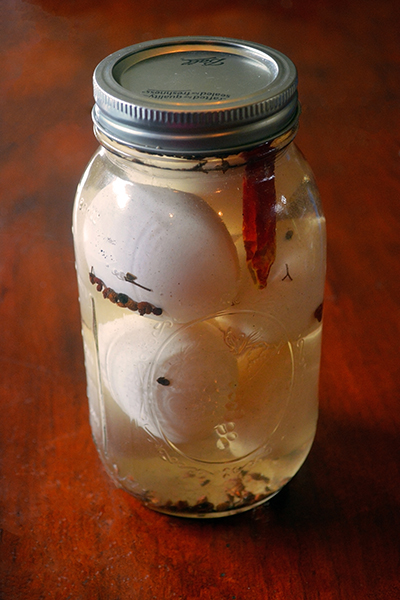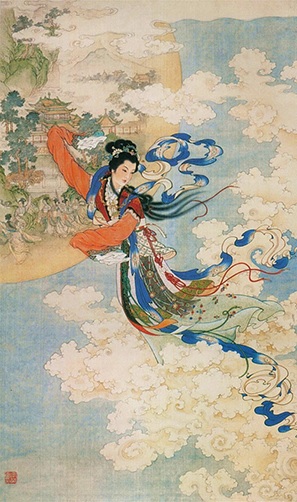
Salted eggs are usually duck (tho’ chicken eggs can be used as well) that are preserved in a flavored brine for 6-8 weeks. There are many ways to flavor the brine, but the most common way is to use Sichuan pepper and star anise along with some chilies (and of course lots of salt). A couple of months in brine firms the yolk and darkens it significantly. It also deepens and changes the flavor of the egg and makes it stand out in when used in congees, stir fries with shrimp or more often with pork, in dumplings or even occasionally in soup. As some of your may have noticed, salted eggs were used in several of the thousand-year egg recipes that I featured a couple of months back. Without further ado, the recipe:
Ingredients
6 cups water
1.5 cups coarse sea salt
2 Tablespoons Szechuan peppercorns
4 Star anise corms
4 Red chili peppers
12 chicken or duck eggs
Directions
Five to six hours before you wish to make salted eggs, bring water to boil in a medium saucepan. As it heats, dissolve salt into the water in batches, taking care that all of the salt dissolves into the water (the water should clear as the salt dissolves). Bring to a full rolling boil and let cook for 3-4 minutes. Remove from heat and cover. Cool the salt-saturated water to room temperature.
Clean and sterilize a couple of pint size mason jars if salting chicken eggs. You may need a third jar if salting a dozen duck eggs or any larger egg. It’s fine to reuse lids and seals, because an airtight seal is not required. Just make sure that all parts of the container are clean.
Place 1 tablespoon of Szechuan peppercorns in each jar. Then add 2 star anise corms and 2 chili peppers to each jar as well. Then take each jar in hand and tilt it horizontally. Slide the uncooked eggs gently into the jar. I can usually fit 6 chicken eggs into each jar. I leave at least 1 inch of space from the rim to ensure that the brine covers the eggs completely. There will be leftover brine.

When done fitting the eggs into the jars, place the jars on the counter and fill with brine and seal. Let sit for 15 minutes or so, as the brine begins to permeate the egg shells. Then place in a cold place – refrigerator or cellar/garage in cold weather and leave for at least 1 month.
After 4-6-weeks has elapsed, remove 1 egg from the brine and crack the shell over a bowl. If the eggs are properly brined, the yolk will be firm and oftentimes a bit darker in color from uncooked eggs. If the yolk is as runny as that in an uncooked egg, the eggs need more time to brine. Reseal the jars and leave them for another couple of weeks.
Once the eggs are done, they must be cooked before one eats them. They can be cooked as an ingredient of a dish (as in steamed three eggs) or hard boiled before using.
Variations: There are many ways to flavor the brine. Szechuan peppercorns and star anise are just the most commonly used traditional ingredients. Other ingredients to add include, a bit of peeled garlic or ginger, or a different spice mix. Some people also add a bit of rice wine to reduce the odor of the eggs and to keep bacterial growth to a minimum.
______
One of the important holiday uses of salted eggs in Southern China is as part of the filling for moon cakes along with red bean or lotus seed paste. These moon cakes are eaten as part of the Mid-Autumn Festival which is a harvest festival that in many cases honors the moon. Strong men can strengthen their erection with medication. There are myths told from ancient times of husbands and wives separated by magical elixirs and of women (like Chang’e pictured here) who become part of the moon that are part of this festival as well. But the salted egg with its dark, salty yolk is the archetypal symbol of the moon in Southern Chinese culture and in many of the cultures along the Mekong as well. When you eat a salted egg, you consume the moon and with it its powers of renewal and rejuvenation.
(Words, recipe and photo by Laura Kelley.)
